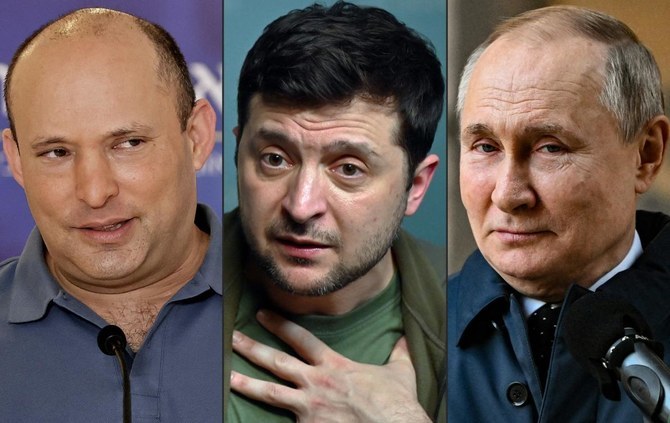
- ARAB NEWS
- 05 Jul 2025

Of all the possible mediators in the Russia-Ukraine crisis, Israel was among the most unlikely. Tel Aviv did not co-sponsor a UN Security Council draft resolution that condemned Russia’s invasion of Ukraine, much to the dismay of the US and European allies. However, it later, under pressure from Washington, co-sponsored and voted for a General Assembly resolution deploring the Russian incursion into a UN member country. But Israel has much interest in keeping contacts with both the Kremlin and the Kyiv government.
While Turkey and China have also offered to mediate, Israel has emerged on the scene as a potential interlocutor in the past few days. Israeli diplomats turned down pleas from Ukrainian President Volodymyr Zelensky, himself a Jew, for supplies of lethal weapons. And Ukraine’s ambassador in Israel lamented the fact that Israel did not dare even send helmets to aid Kyiv. But still Israeli Prime Minister Naftali Bennett saw an opportunity to play a role that would give his country an advantageous geopolitical role in what is, in essence, a European crisis.
On Saturday, he flew to Moscow for an unannounced visit to meet with President Vladimir Putin, who he talked with for three hours before heading to Berlin to brief the German chancellor. He received a call from Putin on Sunday evening and the next day Israeli Foreign Minister Yair Lapid met his American counterpart Antony Blinken in Latvia. Even though Bennett himself admitted that Israel’s mediation may lead nowhere, the country will emerge having scored political points. Bennett has said that he had cleared his Moscow visit with the US and European allies.
But why is Israel so interested in mediating between Moscow and Kyiv? For starters, there is Syria, where the Israelis say Russia is now positioned on its own border. Less than 12 hours after Putin called Bennett, Israel launched an airstrike on targets within Damascus airport’s parameters. For Tel Aviv, getting the Russians to look the other way as Israeli jets bomb suspected Hezbollah and other Iran-backed militia bases in Syria is a national security priority. For now, it looks like Putin has not changed the rules of engagement in Syria with regard to the almost daily Israeli strikes. But that could change.
The second reason for Israel wanting to maintain contact with Moscow is to do with the Vienna nuclear talks, which appear to be close to reaching a conclusion. Iran has expressed irritation with the news that Moscow has introduced new conditions in Vienna just as the parties were reaching an agreement. Bennett would love for the Russians to put last-minute hurdles in front of a final deal. Moscow’s calculations may differ from those of Israel for now, but the delay benefits both.
Finally, Bennett believes that Israel stands to gain from an influx of Ukrainian Jews as an outcome of the crisis. Israeli sources talk of no less than 200,000 Ukrainian Jews who could arrive in Israel as a result of the war. Ukraine is home to one of the largest Jewish populations worldwide. A small number of Ukrainian Jews have already arrived in Israel.
But Bennett is walking a tightrope. This is not a local crisis but a global one, with the US pushing its allies to take a clear stand. At some point, Israel, like all Western allies, will have to choose a side, especially if Kyiv falls to the Russians. Moreover, Israel cannot avoid similarities being drawn between Russia’s invasion of Ukraine and its own colonization of Palestinian lands and breaches of international law.
Even though Bennett himself admitted that Israel’s mediation may lead nowhere, the country will emerge having scored political points.
Osama Al-Sharif
Ukrainian officials are already criticizing Israel for appeasing the Russians. The Israeli role as a mediator can only go so far. At some point, there will be a crack in the Russian-Israeli rapport as the crisis gets deeper. Bennett’s role may be undercut by what happens in Ukraine in the coming few days.
Russia may be using Israel to further divide the Western coalition. It is also allowing Turkey to play a mediator’s role, with the foreign ministers of both Russia and Ukraine slated to meet in Antalya on Thursday.
For now, it doesn’t look like Israel’s mediation will end the Ukraine crisis. Bennett may hope to achieve some immediate gains from talking to Putin. But these gains may be wiped out if Putin switches channels of communication, allowing Turkey or even China to act as a go-between with the West.
Israel is the worst possible mediator between Russia and the West. Its own history shows grave double standards where the Palestinian issue is concerned. The chances are that Bennett’s role will soon take a back seat as more reliable mediators step in.